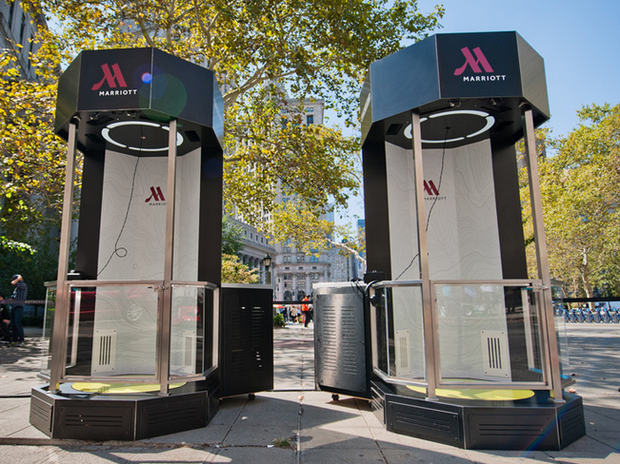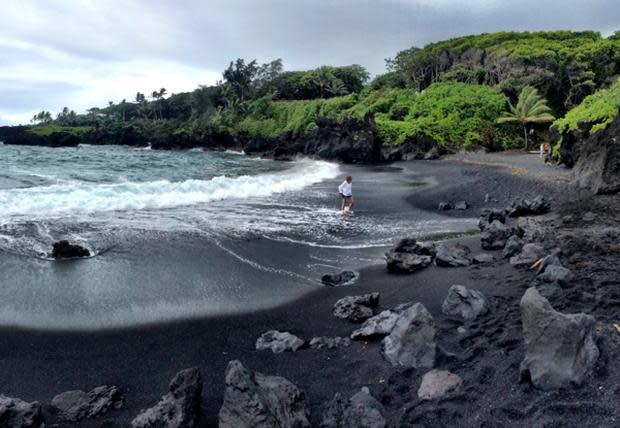Marriott Hotels use VR to connect consumers with tech and travel innovation

Image: Marriott
marriott.png

For newlywed couples walking out of the New York City courthouse last fall, going on a honeymoon involved stepping into a booth and putting on an Oculus Rift headset.
They could go to the beaches of Hawaii or the top of a skyscraper in London, and bounce through the virtual great room of a Marriott hotel in between.
Three minutes later when the couples exited, Marriott was betting they'd be thinking that a real trip to one of these locations was in order. And who knows -- maybe they'd book Marriott.
These booths are cheekily-named Teleporters, and incorporate not only Oculus Rift, but other sensory experiences like artificial sun and wind to create what vice president of global brand marketing Michael Dail called a 4D experience.
"When they were transferred to those places, they got to look up, down, sideways, everywhere they look, they're completely immersed in this physical travel experience, and then the sights, the sounds, the smells," Dail said.
To create these Teleporters, Marriott worked with Framestore -- the studio that worked on the 2013 movie Gravity starring Sandra Bullock and George Clooney, set in outer space -- to take video footage and turn it into virtual reality.
Dail said that even just a year ago when they started work, it was challenging to bring together these various elements into this customized pod.
See: 9 industries using virtual reality
The Teleporter also had cameras running so that users could see and subsequently share on social media after the fact, and a split screen of what they were seeing on the headset compared to how they were reacting to it in the booth.
On the surface, the Teleporter hits the intersection of aspiration and travel, or travel sampling.
"Hotels are going to continue to want to use the internet, mobile devices, smartphones to try to showcase travel experiences," Dail said. "When you go online, whether you're going to a website, whether it's Expedia or you're going to Marriott.com, you're looking at really flat images trying to get a sense of the travel, location, different attractions in that location, even what the hotel experience feels like."
Dail said that one day something like virtual reality could have a great impact on how people make travel plans. Marriott also had a few other aims with the Teleporter.
For one, Dail said they were betting that for most people, this would be their first experience with virtual reality. As the hotel chain's current mission is to "transform the future of travel," that's not a bad role to play -- the intermediary between potential customers and technological innovation.

The view from the Teleporter
Image: Marriott
marriott3.jpg

Plus, using VR fits more broadly into Marriott's efforts to bring tech innovation together with travel through its Travel Brilliantly campaign. They launched an app that allows for mobile check-ins and check-outs and revamped lobbies and rooms, which included features like the location of electrical sockets in rooms, and built a platform to solicit ideas from customers. That even led to the creation of a vending machine for one Chicago Marriott that dispenses healthy food like dried fruit and salads.
At the heart of this is a specific audience: Millennials. They're here and they've got itchy feet.
The Boston Consulting Group reported that on average, Millennials are more interested in travelling, especially abroad, than Baby Boomers, and within five to ten years will be at peak levels of travel spending and hold strong for the next 15 years. Their travel habits are different and expectations involve a lot of mobility and convenience.
And now's the time to snag this section of the market, which may not yet be stuck in brand preferences and loyalties.
"It's not just a marketing idea. There's actual transformation and high tech things happening on the property that this virtual reality helps add more meaning to," Dail said. Something like a virtual reality experience can help jog emotions for users and remind them of the role travel plays in their lives and why they do it in the first place.
The Teleporter has been to eight different cities. Marriott also published videos of the experience online.

